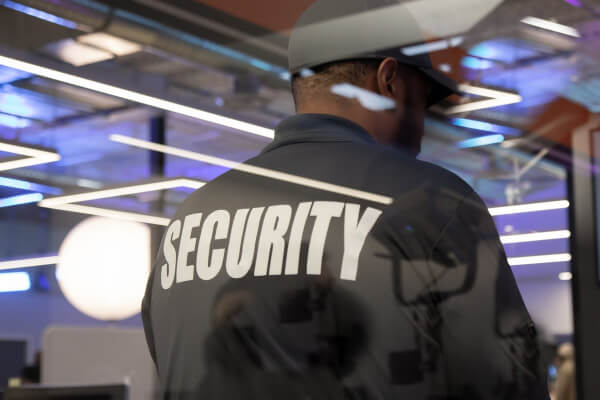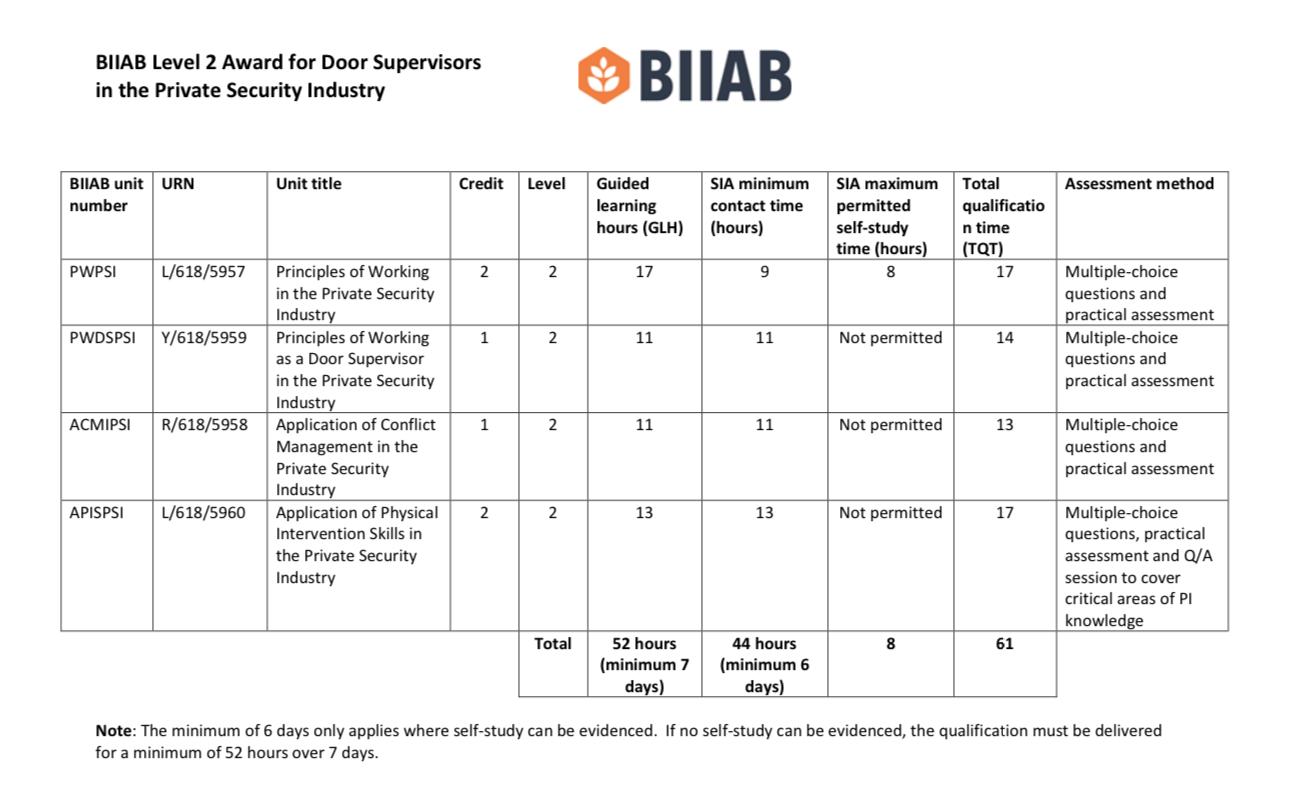Services
Join Us
Private Security Training
Join us for top-notch Private Security Training! Our comprehensive programs are designed to equip individuals with the essential skills and knowledge needed to excel in the private security industry. Whether you’re new to the field or looking to enhance your existing expertise, our training courses have got you covered. Led by experienced professionals, our curriculum covers a wide range of topics, including threat assessment, emergency response, effective communication, conflict resolution, and more. We prioritize practical, hands-on learning to ensure you’re well-prepared for real-world situations. Take the first step towards a successful career in private security and join our training program today! 🛡️👨✈️

BIIAB Level 2 Award for Door Supervisors in the Private Security Industry
Order of delivery and assessment of the Units: It is a requirement that learners undertaking the Level 2 Award for Door Supervisors in the Private Security Industry are trained in the Application of Conflict Management in the Private Security Industry before: The practical assessment of Principles of Working as a Security Officer in the Private Security Industry The practical assessment of Principles of Working as a Door Supervisor in the Private Security Industry The delivery of Application of Physical Intervention Skills in the Private Security Industry The assessment of the Application of Conflict Management in the Private Security Industry unit can be done after the Physical Intervention training has been delivered. Grading The qualification is graded either a pass or fail. In order to achieve the qualification, the learner must pass all four mandatory units. If a learner does not pass every unit, the qualification will not be awarded. *Age Restriction This qualification is appropriate for use in the following age range: 18+ *Entry Requirements English Language Pre-requisite for Learners In the course of their work, security operatives are likely to be required to make calls to the emergency services, or for example communicate to resolve conflict. It is essential that security operatives can communicate effectively. It is the Centre’s responsibility to ensure that each learner is sufficiently competent in the use of the English and/or Welsh language. All assessments must be conducted in the medium of English and/or Welsh as appropriate. Learners should, as a minimum, have language skills in reading, writing, speaking and listening equivalent to the following: A B2 Level qualification on the Home Office’s list of recognised English tests and qualifications A B2 Common European Framework of Reference for Languages (CEFR) An ESOL qualification at (Level 1) on the Ofqual register taken in England, Wales or Northern Ireland An ESOL qualification at Scottish Credit and Qualifications Framework Level 5 awarded by the Scottish Qualifications Authority (SQA) and taken in Scotland Functional Skills Level 1 in English SQA Core Skills in Communication at Scottish Credit and Qualifications Framework Level 5 Essential Skills Wales Communication Level 1. Essential Skills NI Communication Level 1. First Aid Training Requirements: From 01 April 2021, learners taking their Door Supervision or Security Officer training for the first time will need to show that they hold a current and valid First Aid or Emergency First Aid certificate* that meets the requirements of the Health and Safety (First Aid) Regulations 1981. Assessment Principles The Assessment Principles for the Level 2 Award for Door Supervisors in the Private Security Industry have been designed by the Security Industry Authority (SIA) in conjunction with all SIA approved Awarding Organisations. While BIIAB Qualifications Limited has not itself solely designed the strategy, it agrees with the principles and their suitability as an Assessment Strategy for this qualification, it has agreed that this strategy will be applied for this qualification, and it has agreed that it will monitor the compliance of BIIAB Qualifications Limited centres offering this qualification against the criteria. As such all centres and their assessment must adhere to the current Assessment Principles for this qualification. The Assessment Principles for this qualification can be seen in the section which follows and it provides details of the key requirements for the qualification and the assessors and quality assurers delivering, quality assuring and certificating the qualification. Principles of Working in the Private Security Industry This unit will be assessed by both knowledge and practical assessment. The knowledge assessment is an externally set and marked multiple choice question paper consisting of 70 questions. The examination will last for 105 minutes and learners will be required to answer correctly 49 of the 70 questions (70%) in order to pass. The practical assessment is an externally set, internally assessed activity based on the completion of an evidential statement and learners will be required to achieve a pass mark of 100%. Training centres are required to retain copies of the evidential statements completed on record for a minimum of 3 years, the BIIAB Qualifications Limited EQA will sample this activity during a quality assurance visit. Principles of Working as a Door Supervisor in the Private Security Industry This unit will be assessed by both knowledge and practical assessment. The knowledge assessment is an externally set and marked multiple choice question paper consisting of 50 questions. The examination will last for 75 minutes and learners will be required to answer correctly 35 of the 50 questions (70%) in order to pass. The practical assessment is an externally set, internally assessed observation of searching with observation sheet and an externally set and internally assessed observation of using communications devices. The practical assessment must be visually recorded for each learner and is recommended to take approximately 15 minutes. Learners will be required to achieve a pass mark of 100% for the practical assessment. Application of Conflict Management in the Private Security industry This unit will be assessed by both knowledge and practical assessment. The knowledge assessment is an externally set and marked multiple choice question paper consisting of 20 questions. The examination will last for 30 minutes and learners will be required to answer correctly 14 of the 20 questions (70%) in order to pass. The practical assessment is an externally set, internally assessed practical scenario with observation sheet. The practical assessment must be visually recorded for each learner and is recommended to take approximately 15 minutes. Learners will be required to achieve a pass mark of 100% for the practical assessment. Application of Physical Intervention Skills in the Private Security Industry This unit will be assessed by both knowledge and practical assessment. The knowledge assessment is an externally set and marked multiple choice question paper consisting of 30 questions. The examination will last for 45 minutes and learners will be required to answer correctly 24 of the 30 questions (80%) in order to pass. The practical assessment is an externally set, internally assessed observation of each learner performing every technique with observation sheet and Question and Answer session to cover critical areas of physical intervention knowledge. The practical assessment must be visually recorded for each learner and is recommended to take approximately 15 minutes. Each learner should introduce themselves, state the date and the techniques they are demonstrating. Learners will be required to achieve a pass mark of 100% for the practical assessment.

First Aid
Welcome to Emergency First Aid at Work (EFAW) Courses, your go-to destination for professional and comprehensive first aid training. We understand the importance of equipping individuals and businesses with the necessary skills to handle emergency situations effectively. With our specialized EFAW courses, we strive to empower participants with the knowledge and confidence needed to save lives.

